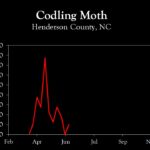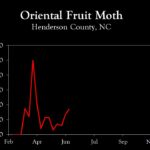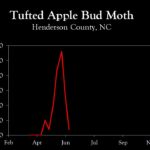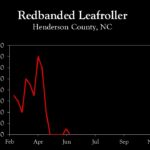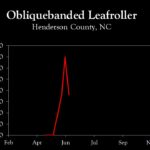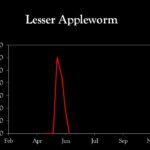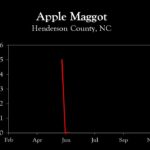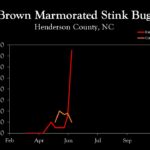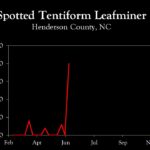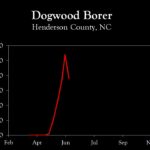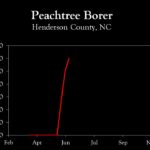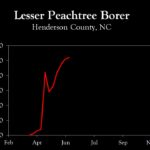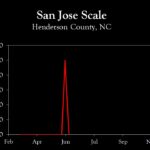WNC Orchard Insect Pest Populations – June 15, 2021
go.ncsu.edu/readext?803431
en Español / em Português
El inglés es el idioma de control de esta página. En la medida en que haya algún conflicto entre la traducción al inglés y la traducción, el inglés prevalece.
Al hacer clic en el enlace de traducción se activa un servicio de traducción gratuito para convertir la página al español. Al igual que con cualquier traducción por Internet, la conversión no es sensible al contexto y puede que no traduzca el texto en su significado original. NC State Extension no garantiza la exactitud del texto traducido. Por favor, tenga en cuenta que algunas aplicaciones y/o servicios pueden no funcionar como se espera cuando se traducen.
Português
Inglês é o idioma de controle desta página. Na medida que haja algum conflito entre o texto original em Inglês e a tradução, o Inglês prevalece.
Ao clicar no link de tradução, um serviço gratuito de tradução será ativado para converter a página para o Português. Como em qualquer tradução pela internet, a conversão não é sensivel ao contexto e pode não ocorrer a tradução para o significado orginal. O serviço de Extensão da Carolina do Norte (NC State Extension) não garante a exatidão do texto traduzido. Por favor, observe que algumas funções ou serviços podem não funcionar como esperado após a tradução.
English
English is the controlling language of this page. To the extent there is any conflict between the English text and the translation, English controls.
Clicking on the translation link activates a free translation service to convert the page to Spanish. As with any Internet translation, the conversion is not context-sensitive and may not translate the text to its original meaning. NC State Extension does not guarantee the accuracy of the translated text. Please note that some applications and/or services may not function as expected when translated.
Collapse ▲Codling moth model DD accumulations range from about 810 in Henderson County to about 1150 in Cleveland County. These values coincide with >95% emergence of first generation moths in Henderson County to completion of first generation flight in lower elevations. Except for those orchards with high populations and where there is little drop in pheromone trap captures, insecticidal control of this pest should not be necessary until about 1400 DD, or when second generation egg hatch begins.
Where tufted apple bud moth is a concern, the window of opportunity to apply an insecticide for season-long control remains open. For growers who have not applied an insecticide effective against TABM in the past 3 weeks, an application should be considered.
For those wondering about the status of brown marmorated stink bug, overwintered adults have completed emergence and are now laying eggs. Based on degree-model predictions, first generation egg laying is approximately 30%, 40% and 60% complete in Henderson, Wilkes and Cleveland Counties, respectively. Some of these eggs have hatched and small to medium sized nymphs are present. While most eggs are laid on wild hosts adjacent to orchards, egg laying can sometimes occur within orchards, especially on peaches. Also, migration of nymphs from wild hosts onto orchard trees adjacent to woods is also possible. Control of nymphs is generally easier than adults, and most neonicotinoids, including imidacloprid, will control these individuals. Emergence of the more damaging F1 adult generation is not expected for at least another 4 weeks (at less than 1000 ft elevation) to 8 weeks (at >2000 ft elevation).
Learn more about southeastern apple insect pests at the Apple Insect Management page.
2021 Average Weekly Trap Captures
| HENDERSON COUNTY | |||
| Insects per trap | |||
| Jun 1 | Jun 7 | Jun 14 | |
| Codling moth | 3.5 | 0.0 | 2.0 |
| Oriental fruit moth | 6.0 | 13.0 | 17.0 |
| Tufted apple bud moth | 28.0 | 14.0 | 2.0 |
| Redbanded leafroller | 0.0 | 1.0 | 0.0 |
| Obliquebanded leafroller | 18.0 | 35.0 | 18.0 |
| Lesser appleworm | 9.0 | 4.0 | 0.0 |
| Apple maggot (abandoned and research orchards) | 0.5 | 0.0 | 0.0 |
| Brown marmorated stink bug (commercial) | 1.7 | 1.8 | 1.0 |
| Brown marmorated stink bug (unsprayed) | 0.5 | 1.5 | 7.5 |
| Spotted tentiform leafminer | 3.0 | 0.0 | 20.0 |
| Dogwood borer | 36.0 | 54.0 | 38.0 |
| Peachtree borer | 0.0 | 5.0 | 6.0 |
| Lesser peachtree borer | 48.0 | 51.0 | 52.0 |
| San Jose scale | 0.0 | 5.0 | 0.0 |
*Note that these averages illustrate only the timing of insect emergence and fluctuations in populations, and are not representative of population levels in any given orchard. The only way to have an accurate assessment of an individual orchard’s populations is to set up traps in that orchard.
2021 Accumulated Degree Days
| HENDERSON COUNTY | ||||
| Jun 1 | Jun 7 | Jun 14 | ||
| Codling moth (Biofix: April 10) |
523 | 632 | 792 | |
| Oriental fruit moth (Biofix: March 27) |
849 | 988 | 1183 | |
| Tufted apple bud moth (Biofix: April 30) |
490 | 629 | 824 | |
2021 Pest Trends (click to enlarge)
Visit WNC Orchard Insect Populations for archived posts.




